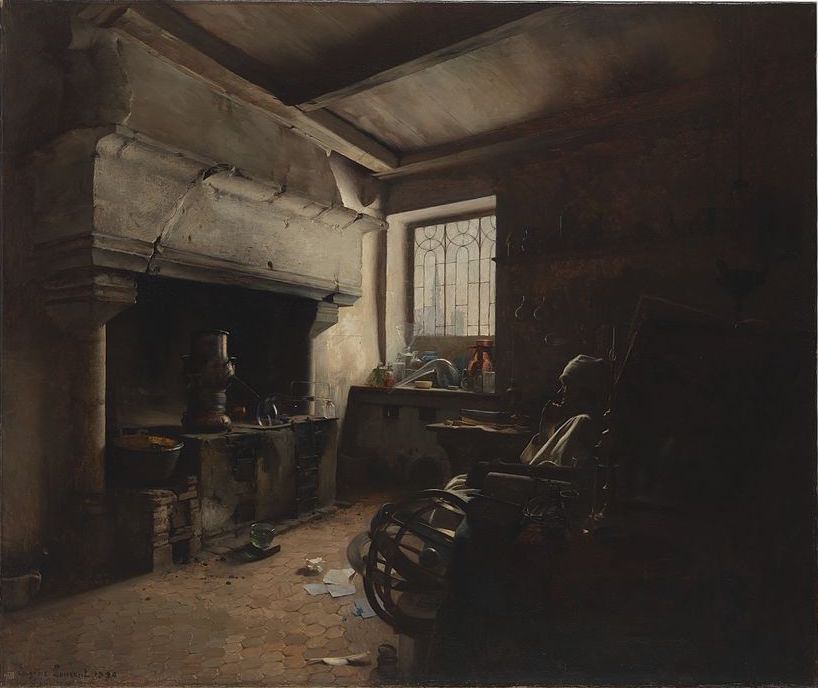【Watch Weekend Sexcapades (2014)】
Golden Brown
Our Daily Correspondent

E. Lomont, An Alchemist, 1890.
Here’s a phrase you don’t read much nowadays: brown study. First cited in the sixteenth century (specifically in a book called Dice-Play), the expression—which describes a state of intense, sometimes melancholy reverie—really seems to have hit its stride in the nineteenth. Dr. Watson describes “falling into a brown study” in the course of “The Adventure of the Cardboard Box.” In Louisa May Alcott’s Eight Cousins, Uncle Alec “paced up and down the lower hall in the twilight for an hour, thinking so intently that sometimes he frowned, sometimes he smiled, and more than once he stood still in a brown study.” In David Copperfield, Dickens uses it like this: “I fell into a brown study as I walked on, and a voice at my side made me start.” Meanwhile, here’s Conrad, in “Thrift and the Child”:
He ceased and sat solemnly dejected, in a brown study. What day? I asked at last; but he did not hear me apparently. He suffused such portentous gloom into the atmosphere that I lost patience with him.
These were all books written for a popular audience; presumably the phrase was in regular use in both the English and American vernacular. What seems puzzling now would not have to a population who knew brown as a color associated with sadness. Indeed, brown was once used the way we do blue today—to connote melancholy. And it’s a good phrase, well suited to stories sustained by brisk narrative pace; in such cases as these, it was doubtless useful to be able to sketch interiority in a couple of words.
However, there are brown studies and brown studies. In an 1867 volume of The Saturday Review of Politics, Literature, Science and Art, a critic took George Sand to task thus: “Whether it be that the veteran novelist has for once overstrained her powers by a forced and unnatural effort, or that a brown study is a mental attitude wholly foreign to the temperament of Madame Sand, La Reverie a Parisstrikes us as about the dullest and most vapid piece of writing in the book.”
After that, I had to read this abomination—and while it didn’t set the world on fire, I thought the reviewer was a bit harsh. In any event, if this is how private musings were greeted, you can see why a writer of the period might have felt more comfortable sticking to a two-word abstraction—however vague.
Search
Categories
Latest Posts
Follow the Pelf
2025-06-25 22:48Ed Sheeran celebrated the 7
2025-06-25 22:24Morphing 'tent house' is all your tree change daydreams realised
2025-06-25 20:37International Man of Monocracy
2025-06-25 20:23Popular Posts
Daddy Issues
2025-06-25 22:427 young black innovators changing the world through entrepreneurship
2025-06-25 20:45It’s Fun to Be in the DSA!
2025-06-25 20:25Featured Posts
The Fatberg Cometh
2025-06-25 22:53A volcano just erupted in Europe and the footage is amazing
2025-06-25 22:26Joe Ricketts, Media Destroyer
2025-06-25 20:44Popular Articles
Freedom to Bash Heads
2025-06-25 22:47The fascinating story behind the coolest name in basketball
2025-06-25 22:25Wild elephants get a lot less sleep than you do
2025-06-25 22:02Cardinal Cons
2025-06-25 20:44Newsletter
Subscribe to our newsletter for the latest updates.
Comments (438)
Resonance Information Network
The Corbyn Cult
2025-06-25 22:55Wisdom Information Network
Adele invites drag impersonator on stage to belt tunes and take selfies
2025-06-25 21:40Steady Information Network
Sean Spicer likes CNN when it works for him
2025-06-25 21:08Neon Information Network
Papa John's new pizza fast pass is either evil genius or just genius
2025-06-25 20:53Heat Information Network
The Professional Friends of YouTube
2025-06-25 20:47